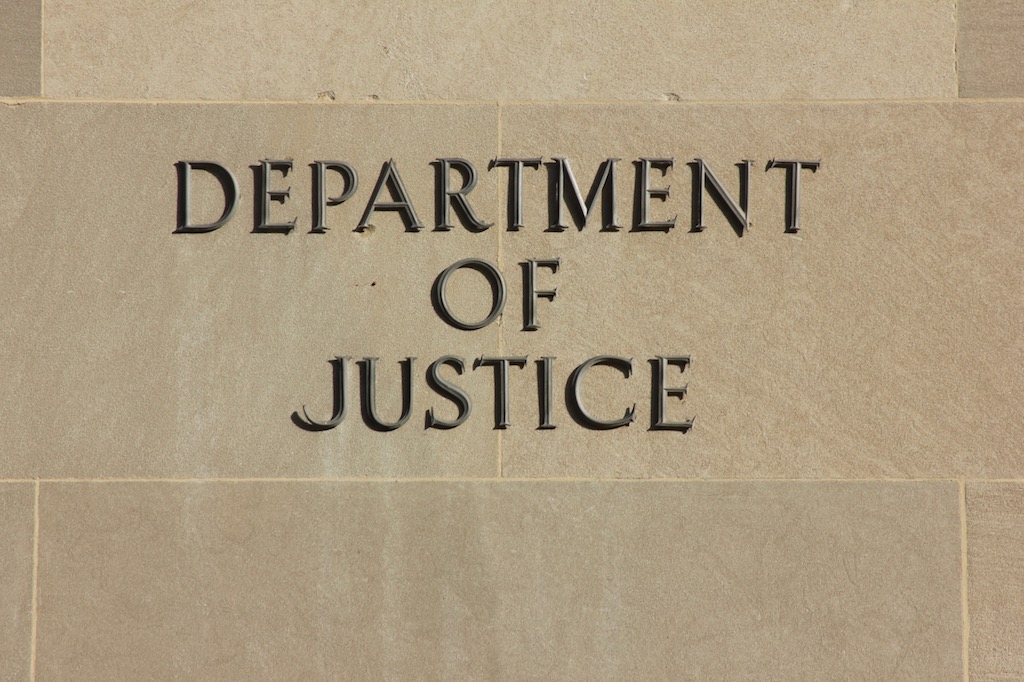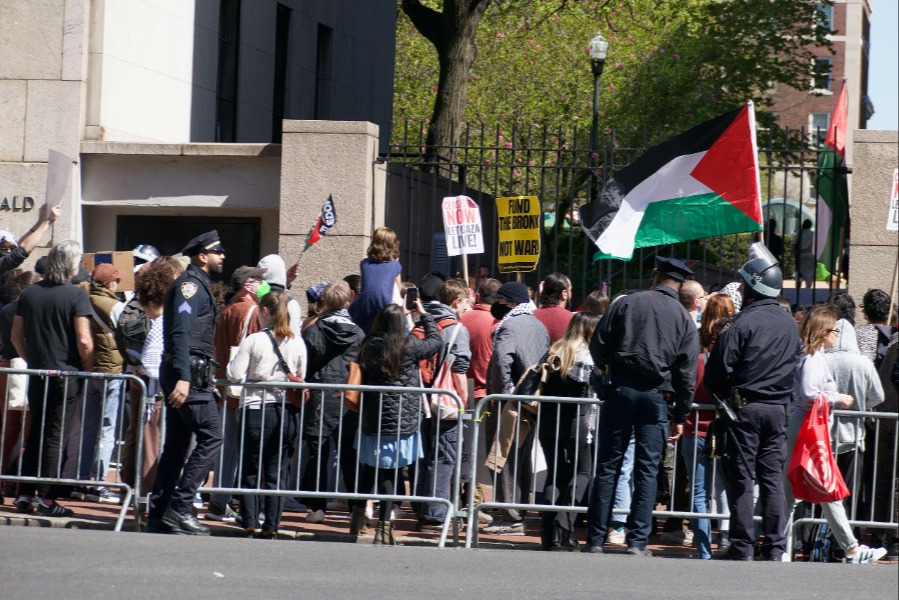Was Trump’s Demand of the Justice Department Appropriate? Let the People Decide.
Over the past week, President Trump has done a great many things that have raised alarm within the national security establishment. He has attacked his attorney general’s recusal from the Russia investigation, approvingly quoted a column describing the “Stormtrooper tactics” of the Mueller investigation, and, most recently, declared his right to pardon himself.

Published by The Lawfare Institute
in Cooperation With

Over the past week, President Trump has done a great many things that have raised alarm within the national security establishment. He has attacked his attorney general’s recusal from the Russia investigation, approvingly quoted a column describing the “Stormtrooper tactics” of the Mueller investigation, and, most recently, declared his right to pardon himself. But though the news moves quickly these days, it’s worth taking a look back at a controversy from a few weeks past: the president’s demand that the Department of Justice investigate the circumstances behind the FBI’s alleged use of an informant to infiltrate the Trump campaign. The news cycle may have moved on, but the incident—and the response—reveals a great deal about differing views of executive power and political accountability.
On May 20, Trump tweeted:
I hereby demand, and will do so officially tomorrow, that the Department of Justice look into whether or not the FBI/DOJ infiltrated or surveilled the Trump Campaign for Political Purposes - and if any such demands or requests were made by people within the Obama Administration!
— Donald J. Trump (@realDonaldTrump) May 20, 2018
Because Attorney General Jeff Sessions has recused himself from the Russia probe, the command fell to Deputy Attorney General Rod Rosenstein to implement. Rosenstein subsequently tasked the Justice Department’s Inspector General to investigate.
I have not heard anyone credibly suggest that the president lacks the legal authority to order such an investigation. After all, the inspector general explicitly comes under the “authority, direction, and control of the Attorney General.” And the attorney general, of course, serves at the pleasure of the president.
Rather, those alarmed by the president’s actions have argued that here the investigation involves the president himself and therefore appears self-serving; the result of an inspector general investigation, or the mere act of publicly initiating such an investigation, could be politically beneficial to him. A president, the argument goes, should not weigh in on “specific” investigations, especially if they involve himself, because that may influence the investigation or create the appearance that the investigation is political. Writing on Lawfare, Bob Bauer argued that Trump therefore violated this “norm” and compromised “Justice Department independence.”
Others, like CIA veteran John Sipher, have practical concerns, such as the potential that a public investigation into the FBI’s use of human sources could make it more difficult for our intelligence and law enforcement agencies to recruit sources in the future. Sipher’s experience in the intelligence community speaks for itself, and I am in no position to question his conclusions.
However, it does not follow from any of these concerns that the president’s act of ordering the attorney general to investigate is improper or an abuse of power. It also does not follow that we should insulate, even through non-legal norms, an unelected agency wielding investigatory and prosecutorial power.
Defining the “Norm”
As a threshold matter, Jack Goldsmith has pointed out that the idea that presidents “strictly comply” with the norm against weighing in on specific investigations is naïve. He notes, for example, that “presidents have let their attorneys general quietly know their preferences on particular prosecutions and investigations.” Here, by contrast, President Trump expressed his demand very publicly. Goldsmith also cites President Obama’s public comments on the Hillary Clinton email investigation. That investigation, of course, involved one of the most important former cabinet members in the Obama administration who was running a presidential campaign largely on the basis that electing her would be a continuation of his presidency. His comments certainly could be seen as “political” and “self-serving” as they at least indirectly involved him.
Yet even the norm that presidents do not weigh in on investigations directly involving themselves is not sacrosanct. Not so long ago, President Bill Clinton expressed “real and serious concerns” about Independent Counsel Kenneth Starr’s investigation of him. That investigation, Clinton asserted, had “gone on too long, cost too much and hurt too many innocent people.” He noted that “the investigation itself is [now] under investigation.” “[I]t is past time to move on,” he concluded. Far more eloquent than Trump’s tweets, to be sure, but no less a violation of a norm against a president publicly weighing in on an investigation of himself.
So Trump is not the first president to violate the “norm” against weighing in on specific investigations. Even if we refine that norm to be “presidents do not comment on specific investigations involving themselves,” that turns out to have been violated no more than twenty years ago—the last time a president was seriously investigated, in fact. And so that leaves us either with a norm that is not really followed, or one so specific that it can hardly be called a norm at all. It may be true that no president before Trump has publicly ordered the Justice Department to conduct an internal investigation of an FBI counterintelligence investigation of the president’s campaign. But it’s not really a norm if no other president, as far as we know, was ever put in a situation even remotely similar.
The Unitary Executive and Political Accountability
Having clarified the “norm” involved, we can now discuss whether Trump was wise to publicly order the Justice Department to investigate the FBI. The short answer is—that is for “We the People” to decide. And in that sense, the very brazenness of his “demand”—perhaps an extension of his other tweets that express his raw thoughts on a particular subject—actually increases democratic accountability, a result consistent with our system of government.
The Constitution of the United States establishes a unitary executive, vesting all the executive power in the president. One of the most famous and compelling defenses of the unitary executive comes from Justice Antonin Scalia’s dissent in Morrison v. Olson, in which the Supreme Court considered the constitutionality of the independent counsel statute (under which Starr would later conduct his investigation of President Clinton). That statute allowed Congress to take on some role in (specific) investigations and prosecutions. While the majority upheld the statute as constitutional, Scalia argued forcefully, and alone, that it impermissibly interfered with the president’s constitutionally assigned control over executive functions—even when dealing with investigations of the executive branch itself. While Scalia stood alone in that decision, many commentators believe history has fully vindicated him and, as Adrian Vermeule puts it, elevated his dissent to “canonical status.”
As if speaking directly to us today, Scalia summarized:
We should say here that the President’s constitutionally assigned duties include complete control over investigation and prosecution of violations of the law, and that the inexorable command of Article II is clear and definite: the executive power must be vested in the President of the United States (emphasis in original).
In other words, Scalia asserted that the president’s power in this area is absolute, even when an investigation involves “alleged crimes by him or his close associates ... .” Of course, Scalia was well aware that exclusive power can be abused, particularly the president’s exclusive authority over investigations and prosecutions.
Scalia argued, however, that our system provides two important checks. First, the other branches can exercise their powers. The Constitution gives Congress the authority to impeach the president, and courts can dismiss malicious prosecutions. Second, and foundational to the idea of democracy, the president is accountable to the people for any abuse of power.
In 1974, for example, the American public clearly determined that President Nixon abused his investigative and prosecutorial power. What happened? Nixon lost support in Congress, which threatened to impeach him. He resigned. His party lost the next presidential election. In other words, Nixon suffered severe political consequences.
Now go back to the decades before Watergate. J. Edgar Hoover’s FBI acted largely as an independent, unaccountable investigative body. It wasn’t until long after Hoover was gone that many of his excesses came to light, and, as Kenneth Ackerman wrote, he “stands as a reminder that 48 years of power concentrated in one person is a recipe for abuse.” (I would also add “unelected.”)
The idea that specific investigations and prosecutions should operate completely independent of elected officials is antithetical to the very idea of democracy. This is not just an argument about whether the president has the legal authority to order an investigation. It goes to the very structure of our constitutional republic. Again, as Scalia stated: “Only someone who has worked in law enforcement can fully appreciate the vast power and immense discretion that are placed in the hands of a prosecutor with respect to the objects of his investigation.” Such power demands accountability. “Under our system of government,” Scalia wrote, “the primary check against prosecutorial abuse is a political one.”
So while calling something “political” is often a dirty word these days, democracy depends on the political accountability of the executive to the people. The alternative—what is often described as “Justice Department independence”—stakes our freedoms on the belief that unelected bureaucrats can be trusted to appropriately wield one of the most dangerous powers of government.
As a former federal law-enforcement agent, I personally believe strongly that the overwhelming majority of our nation’s cops conduct their investigations and prosecutions with integrity and the utmost respect for the rule of law. But it would be naïve—and dangerous—to believe that there are no bad apples or that an overzealous agent or prosecutor would never cross a boundary. As an agent, I never would have asked the American people just to “trust us” that we were not misusing our authority. While internal agency guidelines and norms play an important role in checking behavior, these cannot and should not act as a substitute for democratic accountability. The Founders would not have countenanced blind faith in the inherent goodness of those wielding power. In our system of democracy, power demands political constraints.
Here, President Trump’s exercise of his constitutional authority will be subject to political checks. Unlike a president “quietly making his preferences known to his attorney general,” Trump made his demand about as publicly as a President can these days. The task has been appropriately assigned to Justice Department Inspector General Michael Horowitz who, by all accounts, is the epitome of independence and integrity. That should give us all a measure of comfort.
Finally, the very backlash against Trump on this issue can be seen as a form of political check. Those who think his demand is self-serving can punish him at the polls in 2020. And they can punish his party in the midterms, making it much more difficult to implement his agenda and possibly putting him at risk of impeachment. Maybe some people will take a wait-and-see approach and withhold judgment until Horowitz completes his investigation. Regardless, in the end, We the People will have a chance to weigh in on whether—given the unique set of circumstances here—the president’s actions were appropriate.
What if?
But what about the FBI? It is highly unusual—even extraordinary—for the FBI to task a source to obtain information on a presidential campaign. Of course, it sure seems like we live in extraordinary times. But in a situation with such high stakes and heightened political implications, and in which questions have been raised over the possible political bias of a lead FBI agent working on the counterintelligence investigation into the Trump campaign, surely it is better to have more scrutiny and accountability than less.
To be sure, a number of post-Hoover statutory and internal reforms have been implemented in an effort to check potential abuses. For example, the Levi Guidelines establish criteria for initiating and conducting domestic surveillance operations. And, as Goldsmith notes, the courts, Congress, inspectors general, and the press have vital roles to play. But ultimately, as the head of the unitary executive, not only does the president have the constitutional right to order an investigation into potential wrongdoing at executive agencies, he has the responsibility to do so, regardless of whether it will help or hurt him politically. When it comes to the Department of Justice, the buck stops at the Oval Office. The president must ensure that Justice Department does not abuse its dangerous power because, in the executive branch, only the president is accountable to the people.
So if it comes down to a choice between a norm in which presidents publicly call for specific investigations that could be seen as self-serving, versus a norm in which presidents quietly makes their preferences known—or leave unelected officials alone in their exercise of the immense power of investigations and prosecutions—give me the one that subjects the President to the most democratic accountability.





